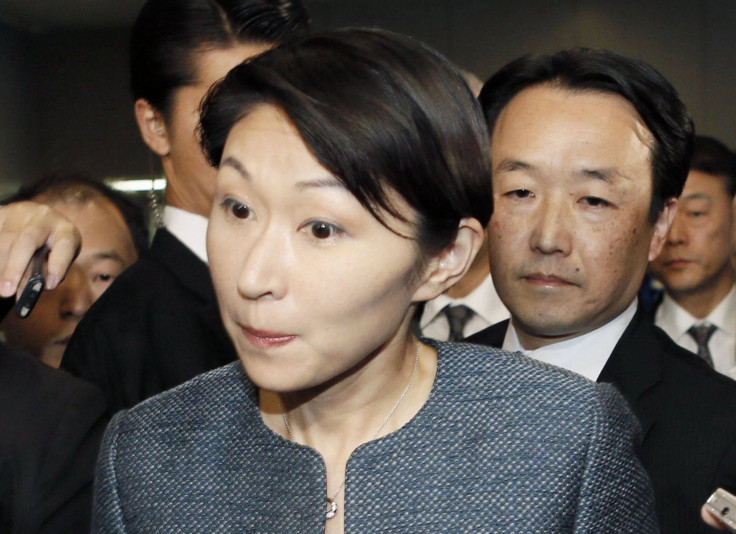Yuko Obuchi Resignation: Japan Minister Seen Likely To Resign Over Scandal, In Blow To PM Abe

(Reuters) - In a blow to Prime Minister Shinzo Abe, Japan's new trade and industry minister will resign as soon as Sunday over allegations that groups backing her misused political funds, Japanese media said.
Yuko Obuchi, the 40-year-old daughter of a former prime minister, plans to report on her investigation of the questionable funding on Monday and then submit her resignation to Abe, the Nikkei and Sankei newspapers said on Sunday.
But the Sankei said Abe's team was considering having Obuchi make her report to the prime minister on Sunday, not waiting for a parliamentary committee meeting on Monday.
Abe tapped Obuchi, a telegenic mother of two, less than two months ago to head the powerful Ministry of Economy, Trade and Industry. She was one of five women Abe chose in a cabinet reshuffle in a bid to bolster his popularity by showing his commitment to promoting women.
Regarded as a contender to become Japan's first woman prime minister, Obuchi apologized during a parliamentary grilling on Thursday over media reports of the misuse of funds, which could violate electoral and political funding laws.
"I feel that ignorance is no excuse," Obuchi said on Friday. On Saturday, she avoided saying if she would quit, telling reporters her first priority was to investigate the funding issue.
The Nikkei and Kyodo News reported that Obuchi had told people close to Abe she planned to resign to take responsibility for the furor. Jiji news wire said her resignation was inevitable.
A METI spokesman said he was unaware of any plans by Obuchi to quit. A person answering the phone at Obuchi's office in her electoral district in Gunma prefecture referred a reporter to her Tokyo offices, where there was no answer.
The departure would be the first Cabinet resignation for Abe, who took office in December 2012. His previous tenure as prime minister in 2006-2007 was marked by scandals among his ministers, several of whom were forced to resign and one who committed suicide.
The Obuchi scandal comes as Abe faces the decision of whether to proceed with a planned but unpopular increase in the sales tax, after a tax hike in April pushed the world's third-largest economy into its deepest quarterly slump since the global financial crisis in 2009.
"The minister is now investigating and will make a report at the start of the week, so I think she will make an appropriate explanation," Tomomi Inada, policy chief of Abe's Liberal Democratic Party, said on Sunday.
"I think she will fulfill her responsibility to make a proper explanation to restore the people’s trust in politics," Inada said during a debate program, when asked about the possibility of Obuchi resigning.
Reports of funding irregularities emerged on Thursday. On Saturday, public broadcaster NHK said two Obuchi political groups spent 43 million yen ($400,000) on annual theater events between 2009 and 2011 and kept no record of spending on the 2012 event.
Another political-funds group bought 3.8 million yen worth of goods from businesses run by her sister and brother-in-law over the four years through 2012, NHK said.
Obuchi told parliament she believed her supporters had paid for the theater events themselves but was aware it would be a legal violation if her political groups made more payments.
After her appointment, Obuchi was given the tough task of trying to gain public trust for the government's unpopular policy of restarting nuclear reactors idled after the 2011 Fukushima atomic disaster.
Abe had hoped the soft-spoken Obuchi would be able to ease opposition to nuclear power, but the controversy could hinder the government's plan, some political analysts say.
The ruling coalition has a hefty majority in parliament, but the opposition Democratic Party has been targeting new cabinet ministers in parliamentary debates in hopes of denting Abe's popularity, still at around 50 percent.
The Democrats on Friday filed a criminal complaint against Justice Minister Midori Matsushima, accusing her of violating the election law by distributing paper fans to voters. The party has demanded that Matsushima resign.
Defense Minister Akinori Eto has also faced questions from the opposition over his political funding.
($1=106.8500 Japanese yen)
(Additional reporting by Yuka Obayashi; Writing by Linda Sieg and William Mallard; Editing by Clarence Fernandez)
© Copyright Thomson Reuters 2024. All rights reserved.











